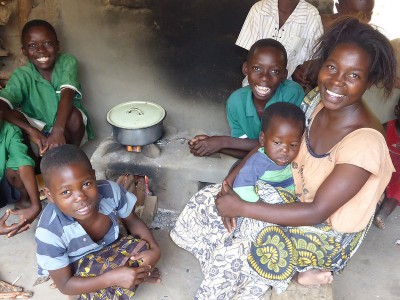
Mere development without an eye to the future is not only insufficient, it can be detrimental to people, nations and the planet. According to the International Institute for Sustainable Development, reducing poverty is one of the fundamental prerequisites for achieving sustainable development. Dining for Women grantees are on the front lines of this issue.
In their book, “Implementing Sustainable Development: From Global Policy to Local Action,” Phillip J. Cooper and Claudia Maria Vargas refer to a common definition of sustainable development, one set forth by the World Commission on Environment and Development: “Humanity has the ability to make development sustainable – to ensure that it meets the needs of the present without compromising the ability of future generations to meet their own needs.”
The Food and Agriculture Organization of the United Nations (FAO) defines sustainable agricultural development as “the management and conservation of the natural resource base, and the orientation of technological and institutional change in such a manner as to ensure the attainment and continued satisfaction of human needs for present and future generations. Such development… conserves land, water, plant and animal genetic resources, is environmentally non-degrading, technically appropriate, economically viable and socially acceptable.”
According to a 2015 United Nations report, the current world population of 7.3 billion is expected to reach 8.5 billion by 2030, 9.7 billion in 2050, and 11.2 billion in 2100.
“Understanding the demographic changes that are likely to unfold over the coming years, as well as the challenges and opportunities that they present for achieving sustainable development, is key to the design and implementation of the new development agenda,” Wu Hongbo, UN Under-Secretary-General for Economic and Social Affairs, said.
Most of the projected increase in the world’s population can be attributed to a short list of high fertility countries, mainly in Africa, or countries with already large populations.
In July 2015, the United Nations Third International Conference on Financing for Development was held in Ethiopia. A new sustainable development agenda emerged from the conference, with broad support for policies and actions that will generate resources in support of the agenda. The agenda, expected to be adopted in September at the Sustainable Development Summit, will build upon the Millennium Development Goals (MDGs) that guided policies from 2000 – 2015. The UN’s new Sustainable Development Goals (SDGs) are designed to complete the work begun with the MDGs.
The conference was just the latest UN focus on sustainability. In June 2015, UN members agreed to develop a legally-binding instrument to conserve and sustainably use marine biological diversity of areas beyond their national borders. In May 2015, the UN Forum on Forests began forging an international forest policy for the next 15 years that will be aligned with the new sustainable development agenda. The current integration of forests into the new agenda demonstrates the increasing recognition of the critical role forests play in eradicating poverty, as well as addressing climate change.
“To build a sustainable, climate-resilient future for all, we must invest in our world’s forests. That will take political commitment at the highest levels, smart policies, effective law enforcement, innovative partnerships, and funding,” UN Secretary-General Ban Ki-moon said.
More than 25 percent of the world’s population relies on forest resources for their livelihoods. Approximately 1.2 billion people use trees on farms to generate food and cash.
Programs that further the goals of sustainable development should include a respect for the cultures involved and a willingness to learn from them, according to Cooper and Vargas.
A number of DFW grantees are solving the everyday problems – the urgent, life and death problems – of those they serve, but they are doing so in a manner that guides and promotes a sustainable effort that will improve life for generations to come.
- SHE (Sustainable Health Enterprises) addresses the problem of access to menstrual hygiene products by producing a pad made from banana fiber, a product that is both affordable and environmentally friendly.
- RIPPLE Africa teaches community members to build brick cooking stoves that greatly reduce the need for firewood, thereby lessening the burden on local forests.
- Community Cloud Forest Conservation employs workshops and leadership training to teach agro-ecology skills that have the potential to effect great change for generations.
- The Center for Development in Central America (twice funded by DFW) works to alleviate poverty through self-sufficiency, with a focus on sustainable agriculture.
- The Hunger Project focuses on alleviating chronic, persistent hunger through local, sustainable agricultural development.
- Gardens for Health International addresses childhood malnutrition through education and long-term, sustainable agriculture.
The focus on improving the lives of women and girls while incorporating a view of a sustainable future continues with our featured programs in 2016. Puente a la Salud Comunitaria (January) empowers women in rural Mexico to grow amaranth, which will improve nutrition and health, create jobs and improve the local and family economy – all through a sustainable, agro-ecological opportunity.
African People and Wildlife Fund (May) focuses on the dual objectives of biodiversity conservation and poverty alleviation. Women learn about the impact of ecological forces on their daily lives, and they are empowered to advocate for the environment.
With a focus on the immediate needs of those they serve and a commitment to creating a better future for all, DFW grantees are employing sustainable practices as a core value and setting the example for conservation and resource stewardship.
